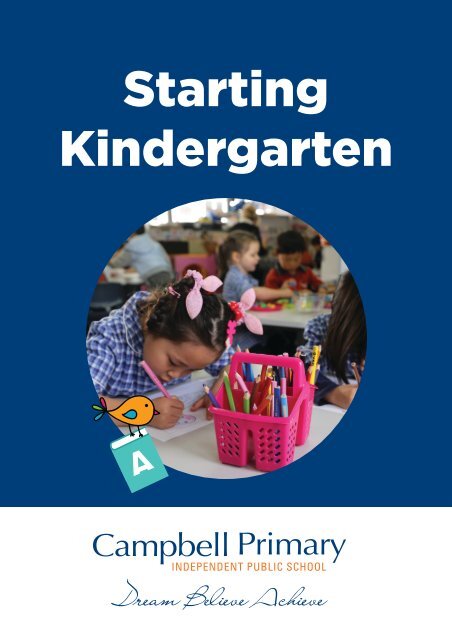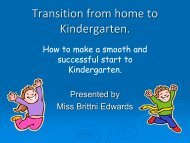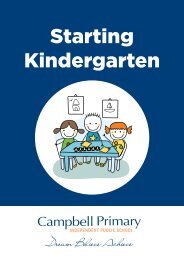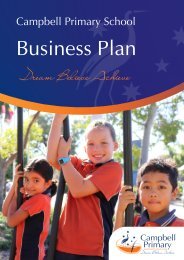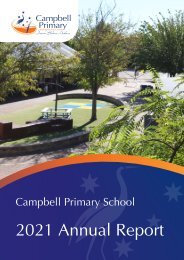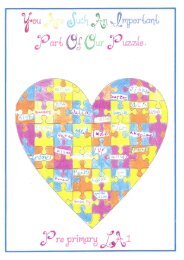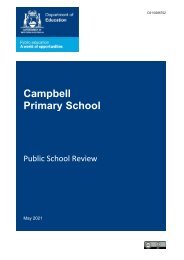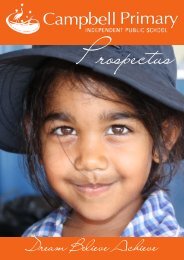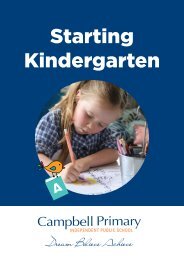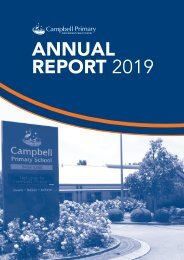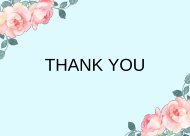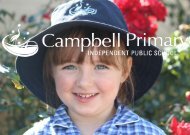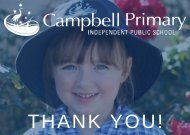CPS STARTING KINDERGARTEN BOOKLET_2019
Create successful ePaper yourself
Turn your PDF publications into a flip-book with our unique Google optimized e-Paper software.
Starting<br />
Kindergarten
About Campbell Primary School<br />
www.campbellprimaryschool.wa.edu.au<br />
For any enquires first contact the school office.<br />
The school office is open between 8:00am and 4:00pm Monday to Friday<br />
during the school term.<br />
School Hours<br />
Classrooms Open: 8:25am<br />
Start Time: 8:40am<br />
Finish Time 2:50pm *<br />
*(2:30pm Wednesdays)<br />
Administration Staff<br />
Principal Ms Lynne Bates<br />
Assistant Principals<br />
Mrs Rebecca Coslani<br />
Mrs Mandy Slee<br />
Mrs Mandy Ward<br />
All teaching staff are trained in Early Childhood Education.<br />
Educational Assistant in each classroom support the teachers in<br />
developing and implementing the learning programmes.<br />
Attendance<br />
Kindergarten students attend 5 days a fortnight between 8:40am<br />
and 2:50pm.*<br />
Classrooms open at 8:25am to allow time for students to settle into their<br />
day and organise their belongings to be ready for learning at 8:40am.<br />
A late note from the office is required if you arrive after the siren.<br />
*(2.30 Wednesdays)<br />
2
Contents<br />
About Campbell Primary School ............................2<br />
School Hours ...........................................................2<br />
Administration Staff ...............................................2<br />
Attendance .............................................................2<br />
Sessions...................................................................4<br />
Daily Routine...........................................................5<br />
The Kindy Program .................................................6<br />
Victorian Modern Cursive Handwriting Style..........7<br />
Aims for Early Childhood .......................................8<br />
For Parents...............................................................9<br />
Parent Involvement in the Kindy Classroom ......... 11<br />
Preparing Your Child for Their First Day ............... 11<br />
<strong>2019</strong> Term Planner..................................................12<br />
It’s My First Day at Kindergarten.......................... 14<br />
3
Sessions<br />
Students will attend Kindergarten from Monday 4 February <strong>2019</strong>.<br />
Week 1<br />
Group A Monday 4 February 8.40 am - 2.50 pm<br />
Tuesday 5 February<br />
Wednesday 6 February<br />
8.40 am - 2.50 pm<br />
8.40 am - 2.30 pm*<br />
Group B Thursday 7 February 8.40 am - 2.50 pm<br />
Friday 8 February<br />
8.40 am - 2.50 pm<br />
Week 2<br />
Group A Monday 11 February 8.40 am - 2.50 pm<br />
Tuesday 12 February<br />
8.40 am - 2.50 pm<br />
Group B Wednesday 13 February 8.40am - 2.30pm*<br />
Thursday 14 February<br />
Friday 15 February<br />
8.40am - 2.50pm<br />
8.40am - 2.50pm<br />
Week 3<br />
Group A Monday 18 February 8.40 am - 2.50 pm<br />
Tuesday 19 February<br />
Wednesday 20 February<br />
8.40 am - 2.50 pm<br />
8.40 am - 2.30 pm*<br />
Group B Thursday 21 February 8.40 am - 2.50 pm<br />
Friday 22 February<br />
8.40 am - 2.50 pm<br />
Refer to pages 12 and 13 for the full calendar *Wednesday early close at 2:30pm<br />
4
B<br />
Numeracy Block<br />
Lunch<br />
Eating and Play<br />
A<br />
8.25:<br />
Our classroom opens<br />
8.40:<br />
Literacy Block Recess<br />
Fruit/ Vegetables<br />
and Play<br />
C<br />
Integrated Curriculum<br />
2.50pm:<br />
School day ends *<br />
*(2:30 on Wednesday)<br />
Daily Routine<br />
Students arriving at school must be accompanied by a parent or carer<br />
and handed into the care of a staff member on arrival.<br />
At the conclusion of the day all students must be collected by an adult<br />
and cannot be released to an older sibling.<br />
5
The Kindy Program<br />
Our teachers use The Western Australian Kindergarten Guidelines, the<br />
Early Years Learning Framework and the National Quality Standards to<br />
guide their learning programs.<br />
Teachers provide a wide range of learning experiences designed to<br />
promote growth and learning across all areas of development.<br />
Purposeful play is a powerful medium for learning and is embedded into<br />
the learning program.<br />
The children learn through whole group, small group and individual<br />
experiences. This includes a mix of explicit teaching and guided<br />
discovery as well as the opportunity for self-directed learning.<br />
We teach the ‘Victorian Modern Cursive’ writing style so please use this<br />
style when practising name and letter writing at home. It is extremely<br />
important that children are only using a capital letter for the initial letter<br />
in their name.<br />
When teaching sounds, our major emphasis is on the sound the letter<br />
makes, rather than the letter name which supports your child’s ability to<br />
sound out when they begin to read and write small words.<br />
6
Victorian Modern Cursive<br />
Handwriting Style<br />
a b c d e f g h i j<br />
k l m n o p q r<br />
s t u v w x y z<br />
A B C D E F G H I J<br />
K L M N O P Q R S<br />
T U V W X Y Z<br />
1234567890<br />
7
Aims for Early Childhood<br />
To achieve the Principles and Practices of The Early Years Learning<br />
Framework for Australia and outcomes as outlined in the Kindergarten<br />
Curriculum Guidelines.<br />
Identity<br />
• Develop a sense of belonging to the Kindergarten community<br />
• Approach tasks and new situations with a positive attitude<br />
• Show resilience and independence<br />
• Show confidence in own capabilities<br />
• Display a positive self-image<br />
• Participate positively as part of a group and respect the rights of others<br />
Connecting and Contributing<br />
• Develop good learning habits such as listening, answering questions<br />
and trying their best<br />
• Develop problem solving, inquiry and ICT skills<br />
• Learn to make friends and socialise in groups<br />
• Follow rules and routines<br />
• Explore and understand the diversity of culture and traditions<br />
• Explore environments and develop an understanding of how to care<br />
for them<br />
Wellbeing<br />
• Develop the Campbell Primary School Virtues of Respect,<br />
Responsibility and Friendliness<br />
• Develop the skills to build friendships<br />
• Begin to read and understand emotions, and self-regulate own<br />
behaviour and feelings<br />
• Development of loco-motor and fine motor skills including balance,<br />
movement, hand-eye coordination, pencil grip and control and use<br />
of scissors<br />
8
Learning and Thinking<br />
• Develop confidence, enthusiasm and curiosity towards learning<br />
• Develop early numeracy skills such as counting principles,<br />
understanding of number, measurement and geometry<br />
• Use enquiry to learn about the world around them<br />
Communicating<br />
• Develop early literacy skills to support the development of reading<br />
and writing<br />
• Build aural and oral language skills<br />
• Develop an understanding of phonological awareness (rhyming,<br />
syllables, hearing sounds in words… etc) through explicit instruction<br />
• Develop concepts of print through reading and early writing<br />
• Communicate effectively in familiar situations to express their needs,<br />
wants, ideas and opinions<br />
More information and online resources are available on the Department<br />
of Education’s website by visiting<br />
https://www.education.wa.edu.au/resources-for-parents<br />
For Parents<br />
Children develop at different rates, learn different skills at different times<br />
and mature at different levels.<br />
Every child is different so if your child does not proceed at the same rate<br />
as a friend’s child or a brother or sister, don’t worry.<br />
First days at school are exciting times for most children and learning how<br />
to cope with this change in their lives is important. School is one of the<br />
big challenges of life outside the home.<br />
Children may push aside their previous dependence on you but they will<br />
still need your support. A child’s outlook on life will be primarily created<br />
in your home with you providing the experience that will foster their<br />
growth and development.<br />
9
A few important points:<br />
1. Be positive when you talk about school to support a healthy<br />
attitude towards receiving instruction.<br />
2. Encourage your child to dress themselves and take care of their<br />
possessions such as hats, jumpers and lunch boxes.<br />
3. Encourage and support independent toileting.<br />
4. Provide the opportunity to experience getting along without you<br />
for a few hours in a day prior to school.<br />
5. Make sure their immunisation status is up to date before<br />
entering school.<br />
6. Teach safe practices in the home, as well as in public such as<br />
crossing the street and interacting with people.<br />
7. Label all items such as clothing, lunch boxes and water bottles.<br />
8. Help them to learn their full name, home address, and phone<br />
number.<br />
9. Visit your local library and read aloud to your child every day.<br />
Talking about what you have read will develop listening and<br />
comprehension skills.<br />
10. Listen to your child’s opinions and ideas and explain rules and the<br />
consequences of denying the rights of other people.<br />
11. Always provide guidance and support while encouraging your<br />
child to think for themselves and problem solve.<br />
12. Shy children need to talk to adults and other children. Encourage<br />
them to make friends and to know that it is safe to talk to their<br />
teacher.<br />
13. One of the aims of most healthy human beings is to be socially<br />
and emotionally competent. School provides the opportunity<br />
for children to interact with others of varying ages and other<br />
adults including teachers and parents.<br />
14. Ensure your child has sufficient sleep at night.<br />
10
Parent Involvement in the Kindy Classroom<br />
Parents are encouraged to participate and assist in the Kindergarten in<br />
whatever capacity they are able such as:<br />
• Parent/Teacher interviews.<br />
• Parent Help Roster – helping in the classroom with activities and small<br />
groups.<br />
• Other rosters eg. laundry.<br />
• Sharing talents and skills with the children such as carpentry, storytelling,<br />
cultural celebrations and ceremonies.<br />
• Open mornings and evenings, sports days and parades.<br />
• Grandparents and other family members are also welcome to come on<br />
roster.<br />
Preparing Your Child for Their First Day<br />
You can help prepare your child for their first day by driving or walking<br />
past the school regularly before the commencement of school and<br />
commenting “That’s where you will be going to Kindy. Can you see the<br />
playground?”<br />
• Talk about starting school in a positive way.<br />
“You’ll have so much fun. I wonder what things<br />
you will do?”<br />
• Remember not to mention how much you will<br />
miss them, or your child will come to the belief<br />
that Kindy will be a lonely place away from you.<br />
• Read books or tell positive stories about<br />
starting school.<br />
• Acquaint your child with their written name so<br />
they can identify their bag tag and personal items.<br />
11
<strong>2019</strong> TERM PLANNER Kindergarten<br />
January<br />
Su M Tu W Th F Sa<br />
1 2 3 4 5<br />
6 7 8 9 10 11 12<br />
13 14 15 16 17 18 19<br />
20 21 22 23 24 25 26<br />
27 28 29 30 31<br />
March<br />
Su M Tu W Th F Sa<br />
1 2<br />
3 4 5 6 7 8 9<br />
10 11 12 13 14 15 16<br />
17 18 19 20 21 22 23<br />
24 25 26 27 28 29 30<br />
31<br />
May<br />
Su M Tu W Th F Sa<br />
1 2 3 4<br />
5 6 7 8 9 10 11<br />
12 13 14 15 16 17 18<br />
19 20 21 22 23 24 25<br />
26 27 28 29 30 31<br />
February<br />
Su M Tu W Th F Sa<br />
1 2<br />
3 4 5 6 7 8 9<br />
10 11 12 13 14 15 16<br />
17 18 19 20 21 22 23<br />
24 25 26 27 28<br />
April<br />
Su M Tu W Th F Sa<br />
1 2 3 4 5 6<br />
7 8 9 10 11 12 13<br />
14 15 16 17 18 19 20<br />
21 22 23 24 25 26 27<br />
28 29 30<br />
June<br />
Su M Tu W Th F Sa<br />
1<br />
2 3 4 5 6 7 8<br />
9 10 11 12 13 14 15<br />
16 17 18 19 20 21 22<br />
23 24 25 26 27 28 29<br />
30<br />
Jan 28 Australia Day Holiday<br />
Jan 29 School Administration Returns<br />
Jan 31 Professional Development Day<br />
Feb 1 Professional Development Day<br />
Feb 4 Students Commence for <strong>2019</strong><br />
Mar 04<br />
April 19<br />
April 22<br />
April 25<br />
April 29<br />
Labour Day Public Holiday<br />
Good Friday Public Holiday<br />
Easter Monday Public Holiday<br />
Anzac Day Public Holiday<br />
Professional Development Day<br />
12
Group A Kindergarten days<br />
July<br />
Su M Tu W Th F Sa<br />
1 2 3 4 5 6<br />
7 8 9 10 11 12 13<br />
14 15 16 17 18 19 20<br />
21 22 23 24 25 26 27<br />
28 29 30 31<br />
September<br />
Su M Tu W Th F Sa<br />
1 2 3 4 5 6 7<br />
8 9 10 11 12 13 14<br />
15 16 17 18 19 20 21<br />
22 23 24 25 26 27 28<br />
29 30<br />
Group B Kindergarten days<br />
August<br />
Su M Tu W Th F Sa<br />
1 2 3<br />
4 5 6 7 8 9 10<br />
11 12 13 14 15 16 17<br />
18 19 20 21 22 23 24<br />
25 26 27 28 29 30 31<br />
October<br />
Su M Tu W Th F Sa<br />
1 2 3 4 5<br />
6 7 8 9 10 11 12<br />
13 14 15 16 17 18 19<br />
20 21 22 23 24 25 26<br />
27 28 29 30 31<br />
November<br />
Su M Tu W Th F Sa<br />
1 2<br />
3 4 5 6 7 8 9<br />
10 11 12 13 14 15 16<br />
17 18 19 20 21 22 23<br />
24 25 26 27 28 29 30<br />
December<br />
Su M Tu W Th F Sa<br />
1 2 3 4 5 6 7<br />
8 9 10 11 12 13 14<br />
15 16 17 18 19 20 21<br />
22 23 24 25 26 27 28<br />
29 30 31<br />
April 30<br />
June 3<br />
July 22<br />
Aug 23<br />
Sept 30<br />
Oct 14<br />
Term 2 Begins for Students<br />
WA Day Public Holiday<br />
Term 3 Begins for Staff and Students<br />
Professional Development Day<br />
Queen’s Birthday Public Holiday<br />
Professional Development Day<br />
Oct 15<br />
Dec 10<br />
Dec 13<br />
Dec 19<br />
Dec 20<br />
Term 4 Begins for Students<br />
Kindy A Concert<br />
Kindy B Concert<br />
Last Day of School for Students<br />
Professional Development Day for Staff<br />
13
It’s My<br />
First Day<br />
at Kindergarten<br />
14
To have fun playing<br />
at school you need<br />
lots of sleep.<br />
15
16<br />
Don’t f orget to go<br />
to the toilet.
Make sure you can<br />
dress yoursel f .<br />
17
Can you write your<br />
name?<br />
Name ______________<br />
18
Is your name on<br />
all of your things?<br />
Sue<br />
Max<br />
Ben<br />
19
20<br />
Be safe.
Stay healthy.<br />
21
22<br />
Listening is f un.
You can make<br />
things at school.<br />
23
24<br />
Reading is f un.
Everyone ‘ s ideas<br />
are important.<br />
25
26<br />
You’ll start to make<br />
lots of f riends and<br />
at the end of school<br />
each day you will<br />
go home.
Bye everyone...<br />
I’’m going to<br />
school.<br />
27
(08) 9456 8300<br />
campbell.ps@education.wa.edu.au<br />
campbellprimaryschool.wa.edu.au<br />
Campbell Road, Canning Vale WA 6155


